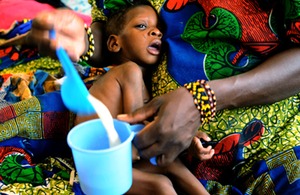Acute malnourishment threatens Niger's children
How DFID helps people in Niger who are facing imminent starvation

Mariama feeds her 18-month-old daughter, Salaha, therapeutic milk. Picture: Rachel Palmer/Save the Children
11 August 2010: In response to the World Food Programme’s latest update on the worsening humanitarian situation in Niger and Chad, Stephen O’Brien, Private Under Secretary of State for International Development, has made the following statement:**
“The current humanitarian situation in Niger and Chad is dire and millions of people are desperately in need of food.
“The UK government has been swift to respond to this crisis, providing food aid to feed over 810,000 people, treating 85,500 malnourished children and providing seeds to more than 81,000 households across the Sahel.
“The World Food Programme and agencies on the ground are working to deliver vital aid to those who need it most but they do not have enough funding to meet all the needs. We are calling on other donors to increase their response to this crisis before it’s too late.”
When 18-month-old Salaha was taken to a health clinic in Aguie, Niger, at the beginning of May, she weighed just 2.8 kilograms - the weight of an average newborn baby in the UK.
“Normally the food shortage is just in May and June,” says her mother, Mariama.
“This year it’s too long. It’s been since February. We have no food.”
An estimated 3.3 million people in Niger are facing severe food shortages as a result of poor rains and harvests in 2009. They are among 4.6 million individuals across West Africa’s Eastern Sahel region - one of the poorest regions in the world - facing imminent starvation.
With the support of UK aid from the Department for International Development (DFID), charities and UN agencies on the ground are able to distribute food aid, treat children with acute malnutrition, help to support families financially and provide seeds for planting.
This month alone, UKaid will feed 325,000 people and treat 8,000 malnourished children just like Salaha.
After two weeks in the UK aid supported nutrition stabilisation unit, which is run by Save the Children, baby Salaha had put on 1.3 kilograms. After 31 days, Mariama was able to take her home.
“When I first arrived here, my child was very sick. Now my child is much better,” she says.
“I’m so happy to go home now because I’m leaving with a child who is healthy. I thank everybody who has helped.”
Key facts and stats
Poor rains and harvests in 2009 have resulted in severe food shortages for around 4.6 million people in West Africa’s Eastern Sahel region.
This includes almost 3.3 million people in Niger, 1.1 million people in Chad and an estimated 260,000 in Mali.
UK aid to the Eastern Sahel region will allow the World Food Programme to purchase and distribute 12,200 tonnes of cereals.
This is enough to: feed over 810,000 people for a month; treat over 85,000 children for acute malnutrition; provide cash for work payments to 20,000 families; seeds to 81,000 families; and help 15,000 families keep a minimum number of their livestock alive.
DFID’s rapid response to the crisis in the Sahel has been made possible by the West Africa Humanitarian Response Fund (WAHRF).
This regional fund enables DFID to respond quickly through selected humanitarian NGO partners in an emergency. These NGO partners include Action Against Hunger, CARE International/Merlin, Medecins Sans Frontieres, Oxfam GB and Save the Children UK.
The UK is also supporting a programme, lead by CARE International, which aims to help the poorest communities withstand future crises, for example through the creation of grain and animal feed stores. This programme will target around 20,000 households.